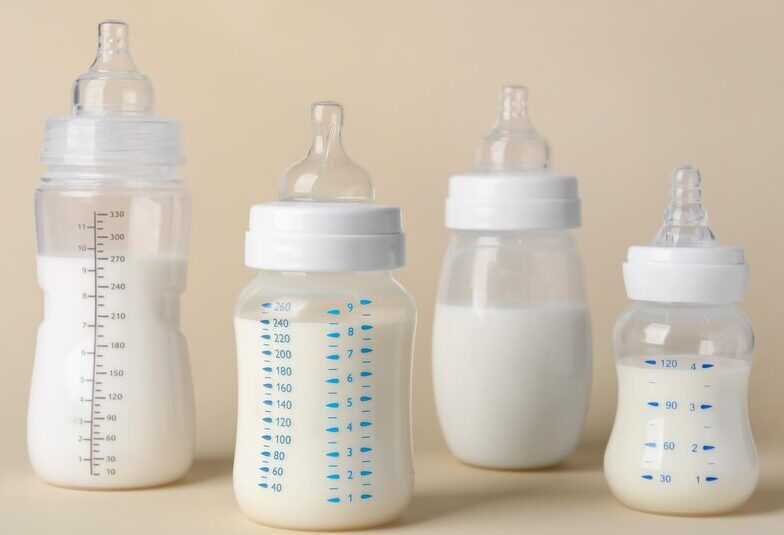SAFE SIPS FOR TINY LIPS: BIS CERTIFICATION FOR FEEDING BOTTLES WITH EXPERT GUIDANCE FROM OMEGA QMS
INTRODUCTION
Feeding bottles are indispensable in infant care, providing a safe medium for nourishment when breastfeeding is not possible or needs to be supplemented. Given that these bottles come into direct contact with a baby’s mouth and milk, ensuring their safety and quality is paramount. The Bureau of Indian Standards (BIS) has laid down specific standards to regulate the safety and performance of feeding bottles. Notably, IS 14625 and IS 5168 govern plastic feeding bottles made from different materials and for distinct design features.
Manufacturers aiming to sell feeding bottles in India must comply with these BIS standards and obtain certification under the Compulsory Registration Scheme (CRS) or Scheme I of BIS. This is where expert consultants like Omega QMS Pvt. Ltd. play a crucial role by simplifying the complex certification journey.
OVERVIEW OF RELEVANT INDIAN STANDARDS
🔹 IS 14625 Plastic Feeding Bottles and Teats
IS 14625 specifies requirements for plastic feeding bottles intended for infants and young children. Key provisions of the standard include:
Material Safety: Bottles must be made of non-toxic, food-grade plastic. Commonly used materials like polycarbonate must comply with migration limits for heavy metals and other toxic elements.
Construction and Design: Bottles must have smooth edges, leak-proof seals, and a secure nipple fit to prevent choking hazards or leaks.
Capacity and Markings: Bottles should have a minimum capacity of 200 ml and bear clear, indelible markings for volume measurement, brand name, and BIS Standard
Mark.
Testing Requirements: Includes mechanical strength, thermal resistance, and chemical safety tests like migration of heavy metals and pH testing.
Hygiene and Cleanability: The design must allow easy cleaning and sterilization.
🔹 IS 5168 Glass Feeding Bottles
IS 5168 covers glass feeding bottles for infants and specifies quality norms to ensure durability and safety. Key highlights include:
Material: Must be made from Type 1 neutral glass (borosilicate or soda-lime silica) that resists thermal shock and chemical leaching.
Finish and Construction: The bottle must be seamless, crack-free, with rounded edges and stable bases to prevent tipping over.
Thermal Shock Resistance: Bottles must withstand high temperature differentials, ensuring they don’t break during sterilization.
Markings: Must include volume indicators, manufacturer’s name or logo, and the BIS certification mark.
Tests: Includes hydrolytic resistance, thermal shock, internal pressure resistance, and dimensional accuracy.
Both IS 14625 and IS 5168 emphasize infant safety through strict quality control and hygiene standards.
FEEDING BOTTLES QUALITY CONTROL ORDER (QCO), 1992 – REGULATORY FRAMEWORK
Issued under the Bureau of Indian Standards Act, 1986, the Feeding Bottle (Quality Control) Order, 1992 mandates that all feeding bottles manufactured, stored for sale, sold, or distributed in India must:
- Conform to the specified Indian Standards (IS)
- Bear the Standard Mark (ISI Mark) from BIS
BIS CERTIFICATION PROCESS FOR FEEDING BOTTLES
The BIS certification process ensures every feeding bottle type conforms to its respective standard. This follows the conformity assessment scheme under the BIS Act, 2016.
Key Steps:
Application Submission: The manufacturer submits detailed product and factory
information.
Product Testing: Samples are drawn and tested in BIS-approved labs.
Factory Audit: BIS inspectors verify quality control systems, traceability, and test facilities.
Grant of License: If requirements are met, BIS grants the license to use the ISI mark.
Surveillance and Renewal: Regular inspections and sample testing ensure continued compliance.
HOW OMEGA QMS PVT. LTD. SUPPORTS MANUFACTURERS
Omega QMS Pvt. Ltd. is a leading consultancy that guides manufacturers through every stage of BIS certification for feeding bottles. With deep expertise in regulatory compliance and quality management systems, Omega QMS ensures a smooth, efficient, and successful certification journey.
Services Offered:
Initial Gap Assessment: Review of current manufacturing and quality practices vs. BIS requirements
Technical Documentation: Complete preparation of required forms, manuals, and compliance reports
Mock Factory Audits: Prepares the factory for BIS inspections with trial runs and corrective advice
Liaison with BIS: Manages the entire communication, application, and scheduling process with BIS
Post-Certification Support: Assists with surveillance audits, renewals, and quality system updates
With Omega QMS as a partner, manufacturers can focus on production while outsourcing the complexities of certification to a capable team.
CONCLUSION
The safety of feeding bottles is non-negotiable, especially when it concerns the health of infants. BIS standards such as IS 14625 and IS 5168 ensure that feeding bottles used in India meet stringent safety and quality benchmarks. By obtaining BIS certification, manufacturers not only comply with Indian regulations but also instill confidence in consumers.
With expert partners like Omega QMS Pvt. Ltd., the path to BIS certification becomes smoother, faster, and fully compliant — ensuring that every sip an infant takes is safe, healthy, and worry-free.
![]()
OMEGA QMS PVT. LTD.
908-909, Hemkunt House, Rajendra Place, New Delhi-110008, India
Phone: 011-41413939(100 lines), Email: info@globalomega.com,
sales@globalomega.com, mktg@globalomega.com

Leave a Reply